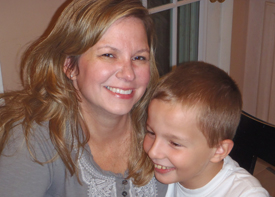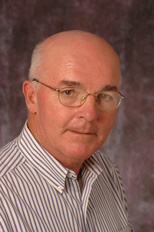Natural Setting Therapeutic Management empowers families, caregivers to handle problem behaviors at home

Sue Howell knew that raising an autistic child would require her to constantly monitor her son, Jack. But his obsession with climbing – onto windowsills, dressers and countertops – left her fearful for his safety. Then there were the numbers he loved to draw. "You could not leave out a pen or he would put numbers on the wall," she says.
Two years ago, the stress of watching Jack, now 9, finally led Howell to seek the help of a program based at Rutgers – Natural Setting Therapeutic Management (NSTM), which provides training to parents to help them control the behaviors of their developmentally disabled children. Every week for a year, a therapist and a graduate student visited Howell's home in Long Valley and offered a series of strategies to address Jack's behavior.
The team created a laminated behavior chart for Howell to mark every 15 minutes that Jack did not climb on anything, rewarding him with a candy or a sticker after he was successful five times in a row. They also developed another chart listing places in the house where Jack could draw numbers – on specific toys or on paper.
"It was just so nice to have someone you could talk to who knew what she was talking about because things that work for a typical child are not going to work with a child with autism," Howell says.
Though Howell's son was never at risk of being institutionalized, NSTM has helped hundreds of other New Jersey families keep their more severely developmentally disabled children from being sent to residential programs by teaching them how to manage problem behavior right in their homes. NSTM, which was moved to Rutgers' New Brunswick Campus 20 years ago, is the only program of its kind in the state and has attracted recognition from behavioral specialists around the world.
"Our model is fairly unique," says Russell J. Kormann, associate clinical professor and NSTM's project director. "There are a few models that are similar but very few. We are constantly asked to present our program at national and international conferences."
The project was launched in 1978 by Michael R. Petronko, who was working at Fairleigh Dickinson University when the state Division of Developmental Disabilities asked him to develop a program to provide training and support to parents of children who were at-risk of being institutionalized. Petronko had created a similar program when he was the chief psychologist of the American Institute for Mental Studies at The Vineland Training School.
"Our focus came to be training the natural caregivers – mostly parents – to become skilled behavior managers," Petronko says. "They had knowledge of their children that we didn't have. We had knowledge of how to do behavioral programs they didn't have. We empowered the parents to develop the skills necessary to maintain their children at home successfully."

In 1992, when Petronko joined the faculty at Rutgers as a research professor, he brought the program with him so that he could continue to teach graduate students how to work with disabled populations. Now housed in the Graduate School of Applied and Professional Psychology, NSTM has trained more than 60 graduate students enrolled in Rutgers’ clinical and school psychology programs.
Over the past two decades, one of the major changes in the program is the clients it serves. When it started, the average age of the clients was 27; now it's 12 and a half. In addition, more people referred to the program now have an autism spectrum disorder, which is due in part to the increase in cases of autism, says Doreen DiDomenico, the assistant director of NSTM.
"The autism community is a lot more vocal and fights for advocacy and support," DiDomenico says. "The fact that they're kind of pushing out there looking for funding and services has brought our kind of program out into their awareness."
While NSTM originated as a project to train caregivers in their homes, it expanded into the schools in 1995, with specialists working in the classrooms to help teachers manage the behaviors of developmentally disabled students. Kormann says the program, which serves 12 counties in northern New Jersey, has saved school districts thousands of dollars by allowing them to keep students in their home schools rather than sending them to out-of-district programs.
Howell, whose son attends a special school for developmentally disabled children, says the year of visits by behavioral specialists from NSTM made a big difference. "We still have our challenges as you do with any autistic child," she says. "But the fact that we don't have to worry as much about his safety is huge. It's helped alleviate the stress in our home."